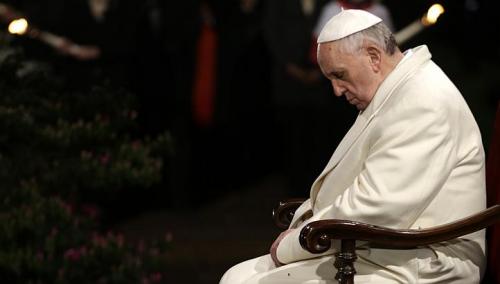
Pope Francis has referred to “so many Muslim brothers and sisters” during a Good Friday procession dedicated to the suffering of Christians from terrorism, war and religious fanaticism in the Middle East.
The newly-elected Pope, who has rankled traditionalists by rejecting many trappings of his office, mostly stuck to the traditional script during the nighttime Via Crucis (Way of the Cross) procession at Rome’s Colosseum, one of the most dramatic rituals of Holy Week.

With torches lighting the way, the faithful carried a cross to different stations, where meditations and prayers were read out recalling the final hours of Jesus’ life and his crucifixion.
This year, the prayers were composed by young Lebanese, and many recalled the plight of minority Christians in the region, where wars have forced thousands to flee their homelands. The meditations called for an end to “violent fundamentalism,” terrorism and the “wars and violence which in our days devastate various countries in the Middle East.”
Pope Francis chose, however, to stress Christians’ positive relations with Muslims in the region in his brief comments at the end of the ceremony.
Standing on a platform overlooking the procession route, Pope Francis recalled Pope Benedict XVI’s 2012 visit to Lebanon when “we saw the beauty and the strong bond of communion joining Christians together in that land and the friendship of our Muslim brothers and sisters and so many others.”
“That occasion was a sign to the Middle East and to the whole world, a sign of hope,” the new Pope said.
Friday’s outreach followed Pope Francis’ eyebrow-raising gesture a day earlier, when he washed and kissed the feet of two women, one a Muslim, in the Maundy Thursday ritual that commemorates Jesus’ washing of his apostles’ feet during the Last Supper before his crucifixion.
Breaking with tradition, Pope Francis performed the ritual on 12 inmates at a juvenile detention center, rather than in Rome’s grand St. John Lateran basilica, where in the past, 12 priests have been chosen to represent Jesus’ disciples.
Before he became pope, Cardinal Jorge Mario Bergoglio long cultivated warm relations with Muslim leaders in his native Argentina. In one of his first speeches as pope, he called for the church and the West in general to “intensify” relations with the Muslim world.
The Vatican’s relations with Islam hit several bumps during Benedict XVI’s papacy, when he outraged Muslims with a 2006 speech quoting a Byzantine emperor as saying some of Prophet Muhammad’s teachings were “evil and inhuman”. And in 2011, the pre-eminent institute of Islamic learning in the Sunni Muslim world, Cairo’s Al-Azhar institute, froze dialogue with the Vatican to protest Pope Benedict’s call for greater protection of Christians in Egypt.
However, Pope Francis’ past outreach to the Muslim community in Argentina seems to have changed that. Al-Azhar’s chief imam, Sheik Ahmed el-Tayyib, sent a message of congratulations to Pope Francis on his election and said he hoped for cooperation.
The Vatican’s efforts to reconcile with the Islamic world have not been welcomed by all. Italy’s most famous Muslim convert to Catholicism, Magdi Allam, announced last week he was leaving the church because of its “soft” stance on Islam. Magdi Allam was baptized by Pope Benedict XVI in 2008 during the high-profile Easter Vigil service when the pope traditionally baptizes a handful of adults.
[youtube yRoOFVcu47Y]